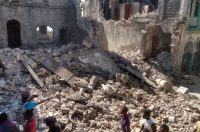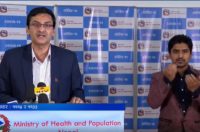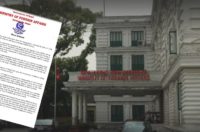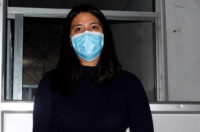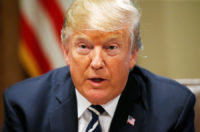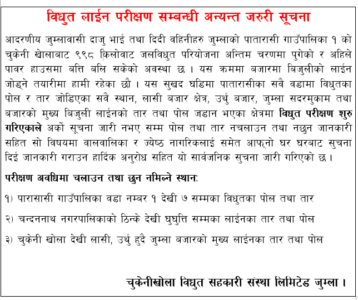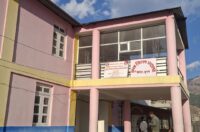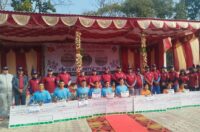
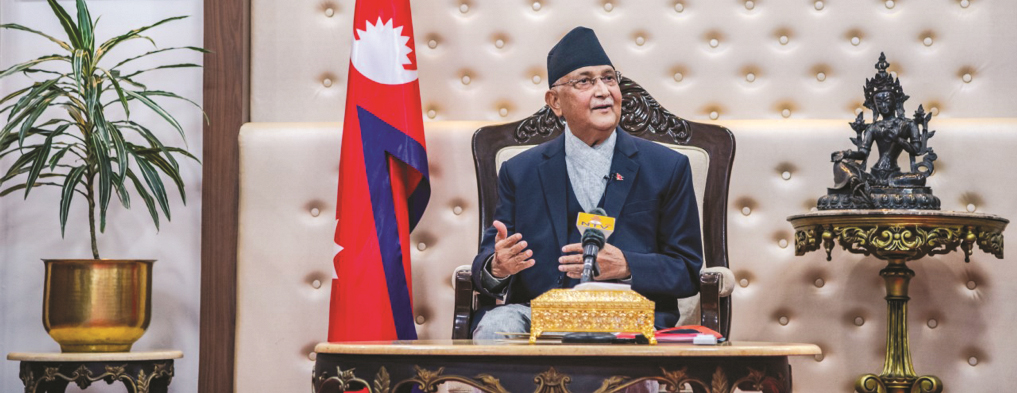
The government announced nationwide lockdown in the wake of the coronavirus (COVID-19) pandemic from March 24 for a week and continued with it so far and has indicated that it would be extended further.
For a country like Nepal which is poor in health facilities, infrastructure and human resources the lockdown, social distancing and border closure are the main alternatives, Prime Minister KP Sharma Oli said in an interview with the state-owned media. He expressed his commitment to employ every alternative to control the spread of the virus and save the lives of people. Excerpts by Gopal Khanal and Modnath Dhakal:
Nepal has succeeded to contain the outbreak of coronavirus so far. But the recent increment in COVID-19 infection cases has spread fears among the people. There is an opinion that whether the success was because there weren’t sufficient tests. How do you assess the efforts to prevent, test and control the virus?
COVID-19 is a challenge for entire humanity. With 2.3 million people infected and more than 150,000 deaths, it is one of the severe crises that the world faced in recent centuries. But Nepal started preparedness well before the pandemic damaged the situation. We could not take the steps distinctive from the neighbouring countries. We could not impose lockdown when the virus was detected in China, because such act would have sent different message to the people and the world. Due to our proactive steps, we have achieved success in containing the virus. Two of the infected people are discharged and only one local case is found so far. However, lack of awareness has resulted in people hiding in various shelters. This is not the disease that can be hidden, it becomes more explosive if hidden. Positive testing in 12 people who were hiding in Terai indicates a serious situation. There can be cases of transmission to the local people and yet unknown to the government and other people. The government is now conducting rapid tests in order to find such cases.
To control the disease, we have imposed lockdown and social distancing is in practice while health caution and awareness programmes are in practice as per the World Health Organisation’s guidelines and experiences from other countries. No one was prepared for the pandemic like this although many countries were better prepared for natural disasters. Even the developed countries do not have enough health facilities and equipment to treat the coronavirus patients. This is like an inferno that burns everyone without any discrimination. It has taught us a lesson that the world needs to think differently. It demands a new world system.
While the developed countries like the USA and France are struggling to manage resources and facilities in the fight with the crisis, China, South Korea and Singapore are performing quite well and India is also faring well so far. What does it indicate and what will be the situation in Nepal?
The situation will be under control in Nepal, it wouldn’t be a disaster. Lockdown will be enforced more effectively to foster social distancing. Health awareness campaigns will be continued. The entry-points at the borders will remain shut. No one can enter the country and the government is taking those people who enter Nepal illegally under control, keeping them in quarantine and testing them. Coronavirus testing facility and human resources have reached all 77 districts. We are conducting tests on people who came from other countries and who came in contact with them. Rapid Diagnostic Test (RDT) and Polymerase Chain Reaction (PCR) test are expedited. The first case was sent to Hong Kong since the country did not have the testing facility but in the last couple of months, we have testing facilities here.
We do not risk the people’s lives in the name of saving the economy. Economy should be brought into life in every possible way but our first priority is to save life. Neither a child should be an orphan nor should a senior citizen be helpless. There wouldn’t be any politics, profit and loss in the economy is the secondary thing. Economy can be rejuvenated next year.
It has been four weeks since the lockdown came into effect. How long will it go?
The country will continue the lockdown as the primary measure against the COVID-19 pandemic while adopting tighter measures at the borders and social distancing. This is not the interest of the government; it is the question of the safety of people. It would be better to continue lockdown than to allow the deadly virus to infect more people and kill them. Increased number of death will create other maladies like depression. As it was difficult to maintain social distancing automatically on the part of the people, the government had to enforce the restrictions on the movement and everyday activities outside homes. Lockdown is proved as an effective measure against the coronavirus in other countries as well. Borders ill be controlled until the virus comes under control globally.
Many advanced countries are fighting fiercely to control the virus and provide beds to the patients in hospitals. They are running short of ventilators and patients are being treated under makeshift tents. They have sent the patients of COVID-19 back to their home due to limited capacity in hospitals. If the same happened here, we would be more helpless due to limited human resource, infrastructure and health facilities. That is the reason we must maintain the measures like lockdown, social distancing, health awareness and border closure. Economy will automatically go down if life gets disturbed. I would like to urge the international community to apply stricter measures. I strongly support the appeal of the United Nations’ Secretary General Antionio Guterres and the steps of the Non-Aligned Movement.
Her, I would like to tell you that the health sector in the country will witness a significant reform in the post-COVID-19 situation. We will have better human resources, facilities and infrastructure across the country.
Nepal has not got success in managing the materials like the personal protection equipment (PPEs) while the procurement activities have been drawn into controversy with alleged corruption. What are you doing to manage this part of the crisis?
There are some people who always play harsh tune against the government. They know the commitment of the government and the PM against corruption. I don’t have dual character. Investigations are underway in Lalita Niwas, wide body plane procurement and gold smuggling cases. Many of the criminals are already behind the bars. But executors of those crimes are playing the untimely tune. This government did not make any decision on those cases but started investigations into them. When the government brings the criminal who threw people into the furnace, they blame the government going against the spirits of good governance. There has been a progress in peace and governance.
Health material procurement is not looked after by the Prime Minister’s Office, but a concerned department under the Health Ministry. Since normal procurement process does not work during the time of crisis, the government needs to bring in the materials via government-to-government or business-to-business contract in a fast track channel; it is the authority of the Director General of the Department of the Health Services. The department makes the decision and informs the ministry. The PM neither deals with procurements nor wants to earn money. My aim is to lead the country on the path of prosperity.
However, the government officials should use their authority in a proper way. We are looking into the case. But I believe that no one should misappropriate public funds during the time of this crisis. There is a small section of people who have always been making statements against the government. Some of them actually want the government to fail even at the cost of the life of people. They think that there are no good people except them.
Multiple actors – the Cabinet, High-Level Coordination Committee and Coronavirus Crisis Management Centre – are creating confusion about the activities to be made against the COVID-19. Since it is the time for the rapid response to the looming crisis, which of them has the primary responsibility?
It is the duty of all. Every citizen is a police. But so far as the government mechanisms are concerned, they have distinctive roles. They all execute the decisions made by the Cabinet. The Cabinet looks after the policy coordination. The HLCC is the main mechanism to implement the Cabinet decisions and the CCMC mobilises the health materials as per the capacity, availability and priority. The Health Ministry coordinates with multiple stakeholders, including the army, police and private sector doctors. There is no overlap in their functions.
Some experts and leaders have suggested for a high-level mechanism to fight with the virus while the main opposition also seems seeking role in the drive. But you recently refuted any possibility of such mechanism?
Have you heard about a high-level mechanism in any developed or developing country? Is there a mechanism in the USA including the democrats and republicans? Even the country where there is minority or joint government, does not have such mechanisms while we have a two-third majority here. We don’t need high-level mechanism. We have asked and received suggestions from the political parties, civil society, private sector and non-government organisations. We need the support from and coordination with all of them. This is the demand of some individuals not the organisations, this is an exception. They want to push the government in the trouble. Who is the civil society? Let’s make a high level mechanism led by the PM including all citizens of the country. Otherwise, who will decide whom to include and whom to exclude?
This government runs as per the public mandate and constitution. It will fulfil its responsibility in an accountable way. We are in dialogue with all concerned stakeholders.
You said Nepal was safer compared to the neighbouring countries, not ‘risk-free’. However, some people are continuously saying that the government could not do as per expectation, it failed in preparedness and in the fight against the COVID-19. How do you take this scenario?
The people you mentioned have preconceived biases against the government, they are seeking instances to make statement against it. You can monitor the media to understand their language, social trend and psychical condition. The government is not here to debate about it works but to show the results. No life is at stake in Nepal while more than 4,000 people are dying daily worldwide. Should we launch a joint fight against the pandemic or worry that no one has died?
They demanded that people should be allowed to enter Nepal and let them go to village with the virus. But the government wants to stop all wherever they are until the situation comes under control. We have talked to various countries about the well-being of Nepali nationals. I myself talked to the Indian Prime Minister and Crown Prince of the United Arab Emirates regarding the safety of Nepali nationals there while communications were also with Kuwait, Oman, Bahrain and Saudi Arabia.
As we cannot bring in our citizens to the country during the worsening situation, the government is talking with the respective governments. They have assured us of equal treatment to Nepali citizens as their own. All of us must understand that this is a common fight against the crisis and there is a strong understanding among the countries in the region.
With the extension of lockdown, workers in the cities and informal sectors in the country and Nepali workers in India had started a long journey on foot and many of them are stranded on the way. What is the government doing to address their troubles?
I urge the media to report to the governments or Hello Sarkar if they find any citizen stranded or facing trouble due to lockdown rather than waiting for the story to be published the other day. It will be more constructive than criticising the government. Twenty four people are in stand by position round the clock to hear the problem and direct to the concern agencies. I request Nepal Television to run a programme to hear the grievance of people so that all the governments can take required actions.
The government has taken immediate steps whenever it knew about such precarious situation of people. Wherever they are found, they are provided with food and shelter. I have seen some provocative comments about the situation. Some even claimed to take them to their houses. The government had already announced to provide food and shelter to all during the time of crisis and we strongly adhere to this policy. I would like to repeat, saving life of people is the first priority. All should remember that the government had given a two-day window to leave the cities if they wanted.
As you said that there is no alternative to continue with lockdown to keep the situation under control. But this prolonged restriction may affect the supply of daily essential goods. How is the government maintaining the supply of foods and daily use commodities?
The government has facilitated the opening of shops of essential goods and is promoting induction cooker. About 1 million people have left the Kathmandu Valley and the consumption has significantly gone down. Refilling plants have enough stock and bullets are waiting to unload the gas. Supply of food and vegetables is satisfactory. In the mountains, the people have harvested millet, potatoes which can be enough for some months. Every district has stock of food and other items.
There are some complaints about the low quality of food items supplied during the lockdown; the government has taken actions against them. I would like to assure again that no one would be deprived of food, medicines and other essential goods. This is not the government of ‘haves’ only, but of all Nepali citizens. It is responsible and accountable to the people.
Nepalis stranded at the Nepal–India border have complained about not letting them to enter the country. The situation of Nepali workers in the Gulf and Malaysia is not less sensitive. The students are also facing growing challenges with the rapid expansion of the virus and continued lockdown in most of the countries. How can their problem be solved?
This is not the time to exhibit nationalism or patriotism nor leave the situation at the nature’s will. India has kept 2186 Nepali citizens in quarantine camps and is providing food. Some people rejected Indian government’s request to stay in the hotel and came to the no mans’ land at the border. We have constructed a makeshift tent for them. Some intellectuals are worried that the COVID-19 has not spread rapidly and making provoking statement. They are criticising the government for not letting them in the country and reaching their home in the far flung villages. Sudurpaschim state has the risk of becoming epicenter of coronavirus. There are people who are turning the pages of the constitution and reminding the government about the right to mobility. Is this the time to implement constitutional provisions? Or mobilise all resources to manage the crisis?
We must not talk about opening the border without assessing the situation in India. The government is not for opening international flights and movements until the crisis comes under control. All the countries we talked with have assured facilities to Nepali nationals as their own citizens. By TRN Online


